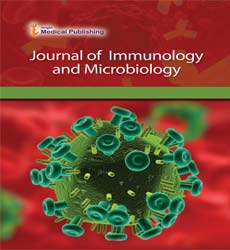Antimicrobial Resistance and Covid-19.
LeiliAghebati Malekibe*
Department of Immunology, National and Kapodistrian University of Athens, Athens, Greece
- *Corresponding Author:
- Malekibe L
Department of Immunology, National and Kapodistrian University of Athens, Athens, Greece
Tel: 302349086
E-mail: Aghebatil3@tbzmed.ac.ir
Received Date: July 28, 2021; Accepted Date: October 12, 2021; Published Date: October 22, 2021
Citation: Malekibe L (2021) Antimicrobial resistance and COVID-19, J Immunol Microbiol, Vol: 4 No: 3
Abstract
The major health emergencies observed during the recent years is coronavirus disease 2019 (COVID-19) pandemic and antimicrobial resistance (AMR). It has been found that along with COVID there is an outbreak of many other diseases. As their measures and consequences are comparable, the COVID-19 pandemic helps to demonstrate the potential prolonged impact of antimicrobial resistance, which is less acute but plays a vital determining role. They may also impact each other as there is a burden to use existing antimicrobials to treat critically ill COVID-19 patients in the absence of specific treatments. Shutdown/lockdowns and various other activities are followed world-wide to manage the spread of COVID-19 which may also lead to a slowdown in antimicrobial resistance. On-going trends like how COVID-19 affects antimicrobial resistance and what we can expect if this scenario remains the same or worsen will help us to plan the next steps for tackling antimicrobial resistance. To measure the impact of current COVID-19 policies and programs on antimicrobial resistance researchers should start collecting data.
Introduction
Major consequences faced by the patients during the COVID-19 treatment or for the patients admitted in the hospital are: Microbial infections: bacterial, fungal, parasitic, crossinfections, Nosocomial infections, etc. People suffering with severe COVID-19, such as those in an intensive care unit (ICU) or the ones hospitalised for the treatment, are particularly vulnerable to bacterial and fungal infections. There are a huge number of reports of the patients admitted with severe COVID-19 suffering with bacterial infections. Various antibioticresistant pathogens were found to cause healthcare-associated infections (HAIs) in COVID-19 patients. COVID-19 has given a huge impact on bacterial healthcare associated infections in a number of ways with an increase in the incidence of New Delhi metallo -β- lactamase producing carbapenem resistant Enterobacterales and carbapenem-resistant A. baumannii has been reported at some hospital when compared with the data before the pandemic. To minimize the use of broad spectrum antibiotics various guidelines for antimicrobial management in COVID-19 patient treatment are discussed. Other studies have reported a decrease in methicillin-resistant Staphylococcus aureus and vancomycin-resistant enterococci cases, which have been attributed to enhance prevention of infection and control of disease practices, are introduced to attenuate intra-hospital spread of COVID-19.
Hospitalized COVID patients with an antibiotic-resistant infection have shown poor outcomes. Although heightened IPC measures are amid a discount in some healthcare associated infections at specific sites, in other situations, COVID-19 has been related to a rise in bacterial healthcare associated infections incidence. To define the cost-benefit relationship of maintaining COVID-19-related infection prevention and control protocols beyond the pandemic to scale back the burden of healthcare associated infections keen research is required. In addition, the prolonged period impact of high usage of certain broad-spectrum antibiotics during the COVID-19 pandemic must be evaluated.
The most common fungal infections in patients with COVID-19 include mucormycosis, aspergillosis or invasive candidiasis. Other fungal diseases, such as Valley fever (coccidioidomycosis), histoplasmosis, and blastomycosis, can cause fever, cough, and shortness of breath, similar to COVID-19 and bacterial pneumonias. Diabetes, conditions or medications that weaken the immune system and cancer patients who lacked other classical mucormycosis risk factors have shown huge number of Mucormycosis cases in patients with severe COVID-19 infection. These infections have been reported as with increasing frequency and are associated with severe complications and in few cases they lead to death. Awareness of these fungal coinfections is utmost essential to reduce any delay in diagnosis and treatment in order to help prevent severe illness and death from these infections.
Open Access Journals
- Aquaculture & Veterinary Science
- Chemistry & Chemical Sciences
- Clinical Sciences
- Engineering
- General Science
- Genetics & Molecular Biology
- Health Care & Nursing
- Immunology & Microbiology
- Materials Science
- Mathematics & Physics
- Medical Sciences
- Neurology & Psychiatry
- Oncology & Cancer Science
- Pharmaceutical Sciences
